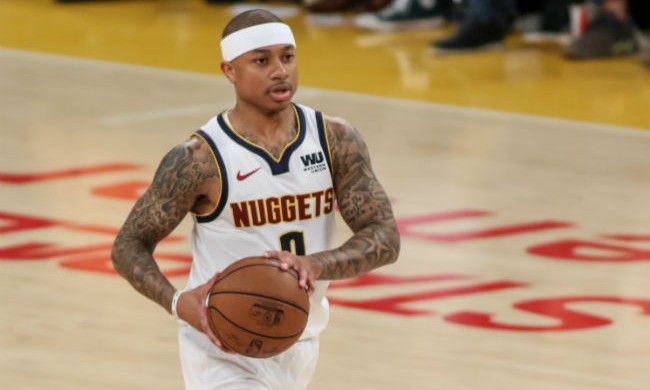
Isaiah Thomas finally returned from his long-delayed hip surgery last month and played in nine games for the Denver Nuggets. Thomas had been a part of the second unit since his return, but yesterday, it was revealed that he will no longer be part of head coach Mike Malone’s rotation going forward.
In the nine games that Thomas appeared in, Denver went 5-4, but lost four of their last five, the only win coming against the hapless Los Angeles Lakers. A dispiriting loss to Golden State forced Malone to reevaluate his lineups, and he decided to trim his rotation and bench Thomas for the foreseeable future. Thomas’s first DNP-CD came in Tuesday night’s game against Minnesota, which the Nuggets won handily.
After missing the first 56 games of the season, on top of missing most of 2017-18 with the same hip injury, it was understandable that it would take Thomas some time to work himself back into game shape. Time, however, is a luxury Denver doesn’t have in the Western Conference playoff race. The Nuggets are one game back of the Warriors for first place in the conference with the Rockets only 2.5 games behind them. Denver’s remaining schedule is significantly more challenging than Houston’s, and FiveThirtyEight projects the Nuggets to finish only one game ahead of the Rockets.
Thomas was the hub of the last team he experienced success with in Boston, but Denver is not built around Thomas’s talents. In fact, the Nuggets offensive ethos is about as antithetical to Thomas’s style of play as possible. The diminutive guard is a high-usage scorer now on a team that prioritizes ball movement. In his last three stops, Thomas’s lowest usage rate was 30.2 percent (per Cleaning the Glass), which came in Cleveland next to LeBron James. Not even Nikola Jokic has a usage that high on this Denver team.
The Nuggets were averaging 312 passes per game before Thomas entered the lineup. That figure has dropped to 283.2 since his return. The passes per game stat doesn’t really have a correlation with how a team performs on offense, considering that Houston and San Antonio are among the least pass-heavy teams, but the drop is an indication that Thomas has caused a disruption in Denver’s offensive flow.
Another indication that Thomas isn’t a natural fit has been the declining play of the Nuggets reserves since he entered the lineup. Thomas had been part of a two-point guard look for the Nuggets alongside breakout sophomore guard Monte Morris. Morris had an offensive rating of 111.3 while leading the second unit, but that has plummeted to 101.8 playing alongside Thomas. During this stretch, Morris’s sterling 6.31 assist-to-turnover ratio has fallen to 3.88. Mason Plumlee, Torrey Craig, and Malik Beasley, all of whom come off the bench, have also had their offensive ratings decline in the last month, though not to the same extent as Morris.
It would be one thing if Thomas carried the bench units at the expense of his teammates’ individual numbers, but he hasn’t been effective scoring on his own either. He is shooting 37 percent from the field, 27 percent from three-point range, and 63 percent from the free-throw line with an assist percentage of 17.2. Each of those marks would be a career-low for a full season.
Denver hasn’t made the playoffs since 2013, and the team hasn’t won a playoff series in a decade. The franchise will end one of those droughts this year, but the season likely won’t be considered a true success unless the latter streak also comes to an end. The Nuggets cannot afford to balance aim goal of winning in the postseason while also providing a place for Thomas to rehabilitate his career. Thomas’s slow timetable for recovery doesn’t match up with what Denver needs in the next two months.
The Nuggets have had to make hard choices with their rotation throughout the season. Juan Hernangomez and Torrey Craig, for example, have had their minutes fluctuate from the single digits to the the high 30s depending on which other players have been healthy for Denver. Thomas’s role modification isn’t unique to this team, but it does engender greater sympathy because of the path his career his taken.
Malone clearly has a strong fondness for Thomas. He had his first NBA head coaching job in Sacramento, where Thomas flourished despite being the last overall pick in the 2011 draft. There was hope that Denver could be the spot where Thomas could rediscover what made him special under a coach who believed in him. A month feels like a short amount of time to give up on that hope, but this is where the Nuggets stand. It is clear that the player Thomas is now does not help achieve the goals of this franchise.






